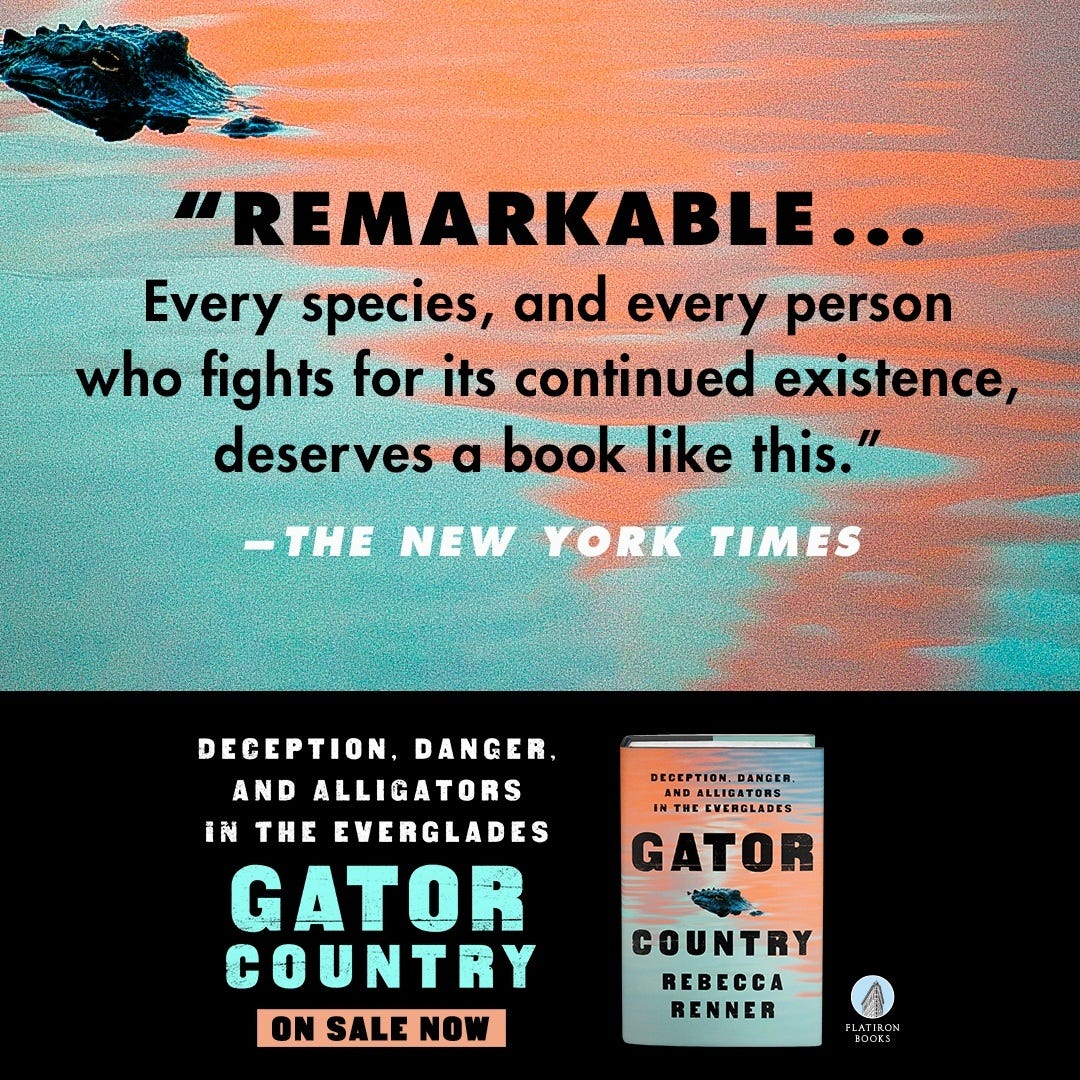Read this if you need some encouragement.
The story of my previous struggles in finding an agent, and how I found the one I have today.
Howdy Friends,
It’s true! The New York Times printed their glowing review of Gator Country in last week’s Sunday Book Review. Just five years ago, that would have seemed impossible. I had gotten so many query rejections that I almost stopped trying. If you've ever felt that way and need some encouragement, I want to tell a story of my previous struggles in finding an agent.
I wrote my first novel in high school and queried it. No agents asked to read it. In college, I wrote another novel. Agents requested full manuscript reads. I got my hopes up, and they were dashed. More rejections.
Then my dad died, I ended up in dire circumstances, and I didn't finish anything for several years. I was busy trying to survive. But I read a lot, too, and fell in love with nonfiction.
Then in 2016, while I was working as a high school English teacher, I wrote a YA novel. I entered a Twitter pitch contest, and an agent requested to read it. She got my hopes up then yanked me around. Ultimately, we had a phone call where she said the book was "not enough like The Hunger Games." It was a dark academia caper before dark academia really had a name. It really could have been popular had that agent had any foresight. Instead, I let her convince me it had no merit. But...
I kept writing. I learned the basics of journalism and started publishing essays and reported stories in newspapers and magazines. I started an MFA, and I wrote a short story that was a runner up for the Disquiet Prize. I also started looking into agents again. I had been hearing conflicting information on how to really get one. A new friend who frequently published short stories in the New Yorker said that agents read shorter published pieces and often reached out to writers whose work they loved.
Having an agent just appear like that sounded like a pipe dream. Other writers told me not to get my hopes up, and when I asked about it in a Facebook group, an argument ensued, spurring a stranger to come to my defense. That stranger is now one of my best friends. She told me about her agent—who found her because of a short story she wrote. The more I looked into her, the more perfect the agent sounded for me. I followed the agent on Twitter, and the next day, she sent me an email.
She had read my published work, and she asked to read some of my fiction. I sent her the novel I was working on. I was excited, but I knew by then not to get my hopes up. I thought it would be weeks before I heard from her again, if I heard from her at all. She emailed me again that night, saying she couldn't stop reading the pages I sent her. She almost missed her subway stop. She asked to talk on the phone ASAP, and she offered me representation. It seemed so sudden. But I had a good feeling.
The previous agent I came close with gave me a bad vibe. But the way Julia made me feel was the opposite. I wasn't just a dollar sign to her. She saw my fullest potential. So, I trusted my gut and signed with her. Two years later, we went on submission with my first book proposal. It ended up in a bidding war, and the editor who won said, "How much do I need to bid to take this off the table? Name your price." Our price was—a lot. A "major deal."
I genuinely love my agent. She's been with me through thick and thin, and over the past five years, we've become good friends. I trust her critique, because she is my biggest fan. She is in for the adventure. I cannot imagine having this relationship with any of the agents I queried before. Even some really great ones were interested, but they wanted to wait until I had something finished. I needed someone who saw my potential. I needed nurturing, and I found that.
All of this is to say: Don't give up. And don't settle for less than you deserve.
Yours Truly,
Rebeccca
This book should be required reading for anyone who wants to get into the publishing industry. With its totally immersive first-person voice, Yellowface grapples with questions of diversity, racism, and cultural appropriation, as well as the terrifying alienation of social media. R.F. Kuang’s novel is timely, razor-sharp, and eminently readable. Yellowface manages to be page-turning, humourous, light, and important all at the same time. It lampoons real problems in publishing in a way that feels cathartic.
I recommend the audiobook, too. Helen Laser's narration is a slam dunk!
Reminder: Rebecca is at the Key West Literary Seminar this week. On Sunday, January 14th, she will be in conversation with Craig Pittman as they discuss, “The Best Beat in American Journalism: Covering the Florida Environment,” from 11:40-12:30 pm. Bring your copy of Gator Country! A book signing will immediately follow their conversation.
Later that afternoon, from 3:45-4:30 pm, Rebecca will be in conversation with Jennine Capó Crucet and Diane Roberts. A book signing will immediately follow their conversation as well.
Follow Rebecca on Tik Tok, Twitter, Facebook, Threads, and Bluesky for more.








Love this! So happy to see you thriving.
Fascinating read. Am in a book lovers’ paradise 💕📚💕